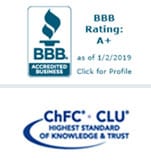

The SECURE Act is the largest piece of retirement legislation to pass Congress since the Pension Protection Act of 2006. Signed into law at the end of December 2019, the SECURE Act went into effect on January 1st, 2020. But that quick turn-around has left many Americans wondering how the bill will affect their retirement plans.
Here’s how the new SECURE Act may impact your retirement:
1. RMDs delayed until age 72
If you are younger than age 70.5, good news: you don’t have to begin taking required minimum distributions until you turn 72. As a result, your money has two more years to grow, untouched, in your account. That’s a big win for retirement-savers. However, if you turned 70.5 in or before 2019, you are still required to take taxable distributions out of your retirement accounts. If this change applies to you, we suggest meeting with a financial advisor to discuss how a delayed RMD start date could impact your retirement plan.
2. Worry-free Roth conversion window extended by two years
Did you know that poorly timed Roth conversions are one of the most common RMD mistakes? Fortunately, the easiest way to prevent a bungled Roth conversion is to convert your traditional IRA before you begin taking RMDs. Under the new SECURE Act, you have an extra two years to convert. Depending on your situation, a Roth conversion can have major tax benefits. Now might be the right time to investigate your options.
3. No age cap for IRA contributions
Under the old rules, working Americans could only make IRA contributions until age 70.5. The new SECURE Act allows Americans to contribute earned income to their IRAs, regardless of age. In 2020, you can contribute up to $6,000 a year to your IRA ($7,000 if you are 50+). However, it’s important to keep in mind that this may be impacted by your income, filing status, and earned compensation, so you may want to consult with a financial professional.
4. The end of Stretch IRAs
As of January 1st, 2020, the Stretch IRA is officially a thing of the past. Although a few special classes can still stretch distributions from an inherited IRA over their own life expectancies, most non-spousal heirs are now required to empty their inherited account within 10 years of the owner’s death. Exempt from this change are spouses, minor children (until age 18 or 21, depending on your state), students under age 26, individuals less than 10 years younger than the account owner, and individuals with disabilities or chronic illness.
Stretch IRAs were a favorite wealth transfer vehicle for estate planners and retirees alike, and the new laws will require many to reassess how they would like to pass on their assets. If your retirement plan included a Stretch IRA, Cowen Tax Advisory Group can help you find an alternative.
5. Penalty-free, taxable withdrawals within one year of a child’s birth or adoption
Under the old law, individuals under age 59.5 faced an early withdrawal penalty for removing funds from a retirement account. The Secure Act now provides an exception for withdrawals made within one year of adopting or giving birth to a child. Keep in mind, however, that although withdrawals made within this timeframe are no longer penalized, they are still taxable.
6. Employers encouraged to offer annuities as part of worker retirement packages
The Secure Act expands employers’ abilities to offer annuities as part of their retirement benefits package. While employers are still required to act as a fiduciary while selecting annuities, they are not required to select the lowest-cost contract and cannot be held liable should an issue arise with the insurer.
7. Complications for trusts and other beneficiaries
Depending on your arrangements, the elimination of the Stretch option may have consequences for beneficiaries and trusts. Now is the time to review your beneficiary designations and estate plan. Revocable trusts, in particular, should be re-examined in the wake of the SECURE Act’s passage since they could now leave heirs with an out-sized tax burden.


Sara McKinney
saractag@gmail.com
As Cowen Tax Advisory Group’s Digital Content Marketing Specialist, Sara provides in-house copywriting and manages the company’s electronic records system, email marketing, and blog.




